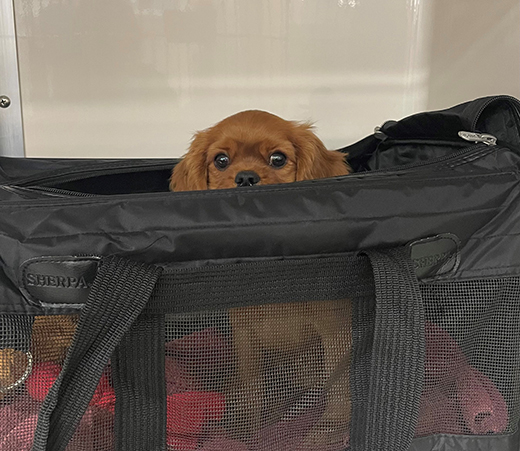K-State veterinarian shares summer travel tips for pet owners
Monday, June 13, 2022

Advance planning is key to smooth traveling with family pets. A Kansas State University veterinarian offers tips to consider before finalizing summer travel plans. Photo courtesy Rachel Gooldy. | Download this photo.
MANHATTAN — Summer travel season is in full swing. A Kansas State University veterinarian says there are many factors to consider when deciding to travel with your pets.
"Make sure that the trip you have planned is suitable for your pet," said Susan Nelson, clinical professor of clinical sciences at the university's Veterinary Health Center. "Many pets experience anxiety when traveling in vehicles or suffer from motion sickness, so it may not be a good idea to take them with you. If you have no option but to take them, you can talk to your veterinarian about medications to help ease their anxiety or nausea."
Nelson recommends having all pets restrained in some way when traveling with them in a vehicle. Cats and small dogs tend to travel best in secured crates, while specialized harnesses for larger dogs help keep them fastened in the vehicle. Allowing pets to remain loose in vehicles can be extremely dangerous because the animal can get between the driver's feet and the pedals. If a window is open, they may jump out and become injured or killed.
"Having your dog ride unrestrained in the back of a pickup is also dangerous due to the risk of jumping or falling out, and it is illegal in some states," said Nelson.
Additionally, since heat stress and heat exhaustion are a common concern during the summer, Nelson said it's crucial to not leave pets unattended in the car, even with the windows cracked open, as temperatures can soar to dangerous levels in a matter of minutes.
For road trips Nelson suggests stopping every two to three hours to allow your dog time for exercise and to relieve itself. Unless leash trained, leave cats in their crates.
"You can bring along a litter box and let the cat use it inside the car during extended trips," said Nelson. "Line the crate with plenty of absorbent material, such as newspaper, in case of accidents — and pack some cleaning supplies just in case."
It's also a good idea to bring along a supply of tap water, food and treats that your pet is used to eating and drinking. This can minimize gastrointestinal distress that can be caused by consuming water or food the pets are not used to drinking or eating. Freezing water in a bowl and then letting it slowly thaw during the trip is a good way to prevent it from splashing out.
If your travel plans involve crossing state lines with your pet, health certificates are required by most states, as well as other possible health requirements. These certificates can only be issued by a U.S. Department of Agriculture-accredited veterinarian. You can check your state of destination's requirements online at the USDA-APHIS Traveling With Your Pet website. If traveling by car, the certificates are valid for 30 days. If traveling by plane, most airlines require health certificates within 10 days of traveling.
In addition to health certificates, some airlines require acclimation statements from the animal's veterinarian that state the animal is accustomed to the temperature. It is important to note that pets are not allowed to fly when temperatures exceed 85 degrees.
"If it is hotter than 85 degrees, no pets are allowed to fly, so you should schedule your flights for early in the morning or during evening hours because of the heat restrictions," Nelson said.
Nelson advises against sedation for a pet that will be traveling by plane. Sedatives can affect a pet's balance and ability to regulate its body temperature, which can be crucial if the pet will be in the plane's cargo hold. If excessive noise or motion sickness are an issue, Nelson advises consulting with your veterinarian about options to make the flight more comfortable for the pet.
"My best advice is to get on the airline's website before booking travel and find out everything they require as far as crate specifics and other flight regulations," Nelson said. "Be aware that many airlines prohibit certain breeds from traveling on their planes, regardless of the time of year."
Regardless of how you are traveling this summer, Nelson encourages pet owners to have some form of identification for their pets. Ideally, a pet will have tags and a microchip, and crates or carriers labeled with pet and owner identification. Consider carrying a picture of your pet in case it should get lost and you need proof of ownership. Also make sure you have enough of your pet's medications, if needed, to last the entire duration of your trip.
When boarding a pet, Nelson suggests checking with the facility on health requirements. The most common requirement is for the animal's vaccinations to be up to date before it is admitted to the facility.
"Core vaccines — the distemper combinations for cats and dogs and rabies — are almost exclusively required," Nelson said. "Most also require kennel cough vaccines for dogs, and some require the canine influenza vaccine. Some facilities may have additional requirements for cats. Be proactive and call ahead to ensure your veterinarian has time to get your pet vaccinated so they will be adequately protected before they arrive at the kennel."
Nelson said many facilities also offer additional amenities, such as individual or group playtime and grooming services. She also recommends confirming drop-off and pickup times for the facility.
Having a neighbor, relative or family friend provide care for your pet is also an option. Certified, professional pet sitters are available in some areas as well. Nelson cautions owners to always have plans in place in case of a pet emergency.
For more information, contact the K-State Veterinary Health Center at 785-532-5690.
